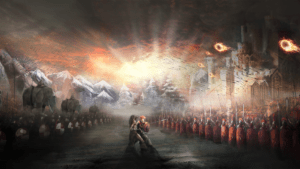Introduction
You discover that you and your spouse are expecting a child. You have neither the finances nor the time to invest in children at this point in life. What do you do? An employee continually breaks company policy and then lies about his actions. How do you respond? Your reaction to every situation in life is determined by what you believe, as you act according to what you consider real. The complete system of your beliefs, the lens through which you view all of life, is your worldview. Everyone has a worldview, though not everyone is aware of what it is. Some have invested time and energy into evaluating what they believe to be true, while many go through life never questioning the beliefs from which their behaviors stem. In all fairness, many people would not know how to examine their worldview or the belief systems of those around them. Such a task need not be confusing or overwhelming. As philosopher Kenneth Samples claims, “By applying methods of critical thinking to the various aspects of each particular worldview, the accuracy of that belief system can be analyzed to determine how well it actually fits reality.”1
In this paper, I will model how one can use logical analyses to test the strength of a worldview. I will systematically analyze the Unitarian Universalist worldview and compare it to biblical Christianity. Through this evaluation, I will show that the Unitarian Universalist worldview is logically incoherent, making claims that fail to correspond with reality. I will then use the same criteria to examine biblical Christianity, showing it is logically coherent and corresponds with reality.
Overview of Worldview Analysis
By answering a variety of questions about the nature of reality, a person’s worldview functions as a road map for life, guiding her choices and day-to-day actions. Each worldview must answer questions about theology, metaphysics, epistemology, axiology, humanity, and history.2 A careful evaluation of how Unitarian Universalism and biblical Christianity respond to each of these categories is beyond the scope of this paper. Therefore, I have narrowed the analysis to three areas:
1. Theology – Concept of God.
2. Axiology – Moral Values
3. Humanity – View of Human Nature.
As a Christian, I have invested much more time and energy investigating biblical Christianity than any other worldview. To gain a greater understanding of the Unitarian Universalist worldview, I interviewed Reverend John McClure, the lead minister at a Unitarian Universalist congregation in the Chicago suburbs.3 Rev. McClure has been a member of the Unitarian Universalist Association (UUA) for more than 40 years, 20 of which he has served as a reverend. During our conversation, Rev. McClure explained that the Unitarian Universalist worldview looks different for everyone. Unlike Christianity, the UUA does not hold to any particular doctrine. Instead, it adheres to seven principles:4
1. The inherent worth and dignity of every person.
2. Justice, equity, and compassion in human relations.
3. Acceptance of one another and encouragement to spiritual growth in congregations.
4. A free and responsible search for truth and meaning.
5. The right of conscience and the use of the democratic process within the congregation and in society at large.
6. The goal of world community with peace, liberty, and justice for all.
7. Respect for the interdependent web of all existence of which humans are a part.
Each member of a Unitarian Universalist congregation agrees to adhere to these principles, yet beliefs vary widely among congregants. Rev. McClure explained that he adheres to a mixture of Buddhist, Catholic, and Humanist teachings, while many members of his congregation adhere to teachings from other various religions and secular philosophies. In my analysis of Unitarian Universalism, I will evaluate the general teachings of the Association at large, along with specific examples Rev. McClure gave in our interview.
Unitarian Universalist Theology
The most fundamental question every worldview must answer is, what kind of God, if any, exists? One’s view of God (or lack thereof) guides her response to every other worldview question. The UUA has its roots in Christian theism. Two religious groups (Unitarians and Universalists) broke away from orthodox Christianity and eventually merged into the UUA.5 Though the UUA has Christian roots, its theological beliefs do not reflect orthodox Christian teaching. Unitarian Universalism teaches that one’s beliefs about the supernatural are internal and privatized.6 Therefore, members of this association hold widely “divergent concepts of God.”7 Some members believe in God, while others hold to a humanism or naturalism model. Many members who believe in God hold to a panentheistic view—the belief that God interpenetrates every part of the universe, yet he extends beyond space and time. Unitarian Universalists accept all theological views, professing, “Truth is the sum of all religious beliefs.”8
Teachings of inclusion and unity, such as the statement above, may sound appealing to those desiring peace and harmony in our pluralistic society. However, upon closer analysis, one finds that such beliefs are logically incoherent. The fundamental law of logic, the Law of Noncontradiction, claims that “A” cannot equal “A” and “non-A” at the same time and in the same way.9 In other words, arguing that opposing statements are both true, violates this fundamental law of logic. For example, a Christian theist would claim that Jesus is divine. A Muslim theist would claim that Jesus is not divine. The Law of Noncontradiction shows that both statements cannot be true. Jesus is either divine or not divine. He cannot be both. In the same way, God cannot both exist and not exist. Either the theist or the atheist is wrong.
The UUA claims to adhere to “Humanist teachings which counsel [them] to heed the guidance of reason.”10 They believe that “all knowledge, from whatever source, requires testing.”11 I asked Rev. McClure if this claim meant that Unitarian Universalists believe the laws of logic to be valid and necessary for sound reasoning. He affirmed this. I then pointed out that confirming opposing theological beliefs denies the Law of Noncontradiction. He responded by claiming that the laws of logic do not apply to religious claims. Spiritual beliefs “provide safety and security in a world that is constantly changing…we all need something to hold onto.”12 In other words, he believes that theological beliefs need not represent truth, they just need to make one feel safe and secure.
This statement alone is enough to render the Unitarian Universalist worldview incoherent. To consider a worldview valid, it must prove logically consistent, for “truth will always be wholly consistent within itself, displaying internal logical harmony.”13 A worldview that contradicts itself (e.g., by opposing fundamental laws of logic, and claiming that feelings trump truth) cannot be considered valid.
Christian Theology
Christian theology differs significantly from that of Unitarian Universalism. While Unitarian Universalists hold to widely “divergent concepts of God,” Christian theism teaches that there is only one true God (Isaiah 43:10).14 This God is self-existent (Exodus 3:14, Psalm 90:2) and knowable (Genesis 18:1). He has revealed Himself to humankind through Scripture (2 Timothy 3:15-17), Jesus (Hebrews 1:1-2), nature (Psalm 19:1-4, Romans 1:18-21), human history (Acts 17:26), and personal conscience (Romans 2:14-16). Christianity teaches that God is one being that exists is three distinct persons—Father, Son, and Holy Spirit (1 Corinthians 12:4-6, Ephesians 2:18). It claims that Jesus is not just a good man or a prophet, but God Incarnate (Romans 1:3-4, Colossians 2:9).
Unlike, the Unitarian Universalist concept of God, the Christian concept of God is logically coherent. Christian theism does not affirm competing ideologies that contradict what Scripture reveals about God. For example, Christianity would hold that the statement “Jesus is not divine” is false. Jesus cannot be both divine and not divine. Christianity follows the fundamental laws of logic, holding concrete ideas about God.
Christianity also teaches that truth triumphs personal feelings and beliefs (Romans 1:25, Isaiah 44:20). Unlike the Unitarian Universalist view that disregards truth for the sake of feeling secure, the Christian worldview teaches that truth provides the basis for security (Matthew 7:24-25, John 8:32). God is truth (Hebrews 6:18), and He offers Himself as a firm foundation upon which humans can stand in times of ease and times of distress (Psalm 46:1-3).
Unitarian Universalist Axiology
In addition to theology, worldviews also address questions of axiology—“the origin, nature, meaning, and criteria of values.”15 For the purpose of this essay, analysis of axiology will focus on the origins and standards of morality in each system. The UUA bases moral values on concepts of “compassion, justice, equity, the right of conscience, reason, and respect for others.”16 They claim, “As Unitarian Universalists, we have a responsibility to give voice to the moral values on which our faith is grounded, not only with a statement of conscience but through acts of conscience that honor the values we espouse.”17 I asked Rev. McClure if this statement meant that all Unitarian Universalists adhere to the same set of morals or if morality differed among congregants. He explained that Unitarian Universalists believe morality is subjective—meaning that moral standards will look different from person to person. I then asked where people should derive their moral standards. He explained, “Each of us must look within to find our moral ground and live consistently within that framework. There are consequences if we do not do that. It varies from person to person. There is no absolute standard.”18
This last statement piqued my interest. I asked Rev. McClure if he would ever counsel one of his congregants to change their moral standards or if he finds all actions morally acceptable. He responded by saying, “There are boundaries within morals. Harming another person is a boundary we all adhere to. There is a moral absolute there.”19 I was confused by this answer. How can he believe “there is no absolute standard,” if he admits that moral absolutes exist?20 I questioned him on this, and he responded by explaining that there are indeed some moral absolutes, which are discoverable by living in community with one another. “Being in community helps us get clarity on our values and test our values and understand where our values have difficulty. It’s internal and communal.”21 According to his worldview, morality is subjective—differing from person to person, as well as from community to community—yet, somehow, certain objective standards apply.
Once again, we find that the Unitarian Universalist view is logically incoherent. Objective morality cannot both exist and not exist at the same time. If any objective moral standard exists, then one cannot claim that morality is subjective. Doing so denies the Law of Noncontradiction. Not only is this position self-refuting, but it is not externally livable. We live in a world of objective truth. Mentally healthy individuals do not jump from skyscrapers because the law of gravity is objectively true. Drivers of motorized vehicles stop at red lights because the danger of colliding with cross traffic is objectively true. Homeowners pay monthly mortgage payments because bank repossession of homes is objectively true. Unitarian Universalists may claim that morality is subjective, but they do not live this way.
Rev. McClure affirmed this in our time together. After insisting that morality differs from person to person, he explained that everyone is responsible to “be the voice of the prophet,” opposing wrongs against others.22 Labeling an action “wrong” shows that he believes there are objective moral standards. One who believes morality is subjective cannot claim that the decisions and activities of another person are wrong. Such actions may fall within the acceptable moral framework of another. Therefore, individuals who hold to subjectivism do not have any ground for labeling certain actions “wrong” and pushing for social change. Subjective morality, based on personal moral grounding, may sound appealing, but one cannot consistently live this way.
Christian Axiology
Christianity claims that morality is objective. Scripture teaches that God is the creator and sustainer of all things (Colossians 1:16-18). He is both outside and above His creation (Isaiah 55:8-9), giving Him the right to be the moral law-giver. Scripture teaches that God is good (1 Chronicles 16:34, Mark 10:18), being in and of Himself the objective moral standard to which His creation must adhere. God has revealed Himself and these objective moral standards in His Word (Leviticus 18:1-5).
Scripture also teaches that God created humans in His image (Genesis 1:27). Therefore, they are above all other created beings—holding the responsibility to care for creation and live according to God’s law (Genesis 1:26). As image bearers of the one true God, humans have this objective moral law written on their conscience (Romans 2:14-15). This principle explains why we have an innate desire for justice and an understanding that actions such as theft, rape, and murder are objectively wrong.
Unlike the Unitarian Universalist view of morality that is self-refuting, the Christian view of morality is logically coherent and externally livable. Christianity follows the laws of logic, claiming that morality is objective. What God has stated is good, is good. What He has condemned as evil, is evil. These objective standards provide a moral framework under which individuals can live consistently, and society as a whole can operate and thrive. Furthermore, it reflects the moral standards written on the conscience of every individual.
Unitarian Universalist Humanity
Another important area addressed by worldviews is humanity—the “origin, nature, problems, and destiny of human beings.”23 The following analysis of mankind will focus on the Unitarian Universalist view of human nature and civilization’s greatest problem. In our discussion, Rev. McClure informed me that Unitarian Universalists believe that “all people have inherent worth and dignity.”24 He then explained that humanity’s fundamental problem is we do not care about one another—treating one another without the value and dignity humans desire. Because he had already shared that Unitarian Universalists believe morality is subjective, I asked on what grounds he believes in the natural dignity and worth of humans. He responded by saying that humans do not have inherent dignity and worth, but we must treat one another as if we do. I then asked if Unitarian Universalists believe that this fundamental problem (not treating one another as if we have value and dignity) is a problem that stems from within humans or comes from outside influences. He explains, “At everyone’s core there is a goodness, but that can be destructed,” as the person embraces misguided values from those around him.25
Similar to their views of theology and axiology, The Unitarian Universalist view of humanity does not follow principles of sound reasoning. First, it fails to address and account for the internal needs of humanity adequately. All humans experience longings for love and acceptance. We want others to value us and treat us with respect and dignity. According to the Unitarian Universalist worldview, these longings do not reflect reality. Within the framework of subjective morality, humans do not have the inherent value and dignity we crave; however, they must somehow live as if we do. To live consistently within the Unitarian Universalist worldview, one must act in a way that does not correspond with reality—convincing oneself to live out something known to be false. A worldview that requires one to live in a way that does not correspond with reality is not internally and externally livable.
The Unitarian Universalist worldview also fails to give sufficient support for their claims about humanity’s greatest problem. The UUA teaches that humans are fundamentally good, but learning wrong values from others results in their corruption. But, where does this decadence originate? Their response is that this corruption derives from the negative influence of others. The argument is circular and fails to explain the root of such corruption.
Christian Humanity
Christianity affirms that humans, created in the image of God (Genesis 1:27), have inherent dignity and value, and are characteristically distinct from all other creatures (Genesis 1:26). Dissimilar to every animal on earth, people enjoy unique creative and intellectual abilities, are self-conscious and introspective, and pursue lives of purpose and significance, rather than mere survival.
The Christian worldview claims that humanity’s fundamental problem is sin—thoughts, words, and deeds that break God’s moral law. Sin causes a separation between humanity and God (Isaiah 59:2). Scripture teaches that sin entered the world when Adam and Eve chose to disobey God (Genesis 3:6-7), causing their offspring to be born with a sin nature (Psalm 51:5, Romans 7:17-18). As a result, we have an innate propensity toward sin, and willfully choose to disobey God (Romans 3:23). Christianity teaches that God did not just leave humans in this fallen state. He decided to send His Son to make atonement for human sin (Romans 5:8). God freely offers forgiveness to any who choose to trust in Jesus’ atoning work on the cross as the payment for their sin (Romans 10:9). Receiving this pardon restores fellowship with God (Ephesians 2:13) and grants eternal life (Romans 6:23).
Unlike the Unitarian Universalist view, the Christian worldview offers an internally livable explanation of human desires, teaching that people are created in the image of God and long for significance and just treatment. Its description of humanity’s fundamental problem is logically consistent, and Christianity provides a practical solution for sin, through the redemption offered through Jesus’ death and resurrection.
Conclusion
The teachings of Unitarian Universalism thrive in a pluralistic society, where people are captivated by the philosophy that you believe whatever you want about God, can live according to any moral standard, and the only requirement is that you treat others with dignity and respect. However, a logical evaluation of these claims shows that they consistently fail to provide a coherent worldview framework. The teachings of the UUA are self-refuting—making them both externally and internally unlivable. In stark contrast, Christian teachings on theology, axiology, and humanity are logically coherent, correspond with reality, and gives a framework for life that is both internally and externally livable. Under careful analysis, it becomes clear that the Christian worldview is superior to that of Unitarian Universalism.
- Kenneth Richard Samples, A World of Difference: Putting Christian Truth-Claims to the Worldview Test, (Grand Rapids, MI: Baker Books, 2007), 32.
- Ibid., 23.
- A pseudonym has been used, per request of the interviewee, to protect his privacy.
- “Our Unitarian Universalist Principles,” Unitarian Universalist Association, accessed December 4, 2016, http://www.uua.org/beliefs/what-we-believe/principles.
- “History of Unitarian Universalism,” Unitarian Universalist Association, accessed December 4, 2016, http://www.uua.org/beliefs/history.
- “Theological Perspective,” Unitarian Universalist Association, accessed December 4, 2016, http://www.uua.org/governance/polity/47002.shtml.
- “Leader Resource 3: Common Views Among Unitarian Universalists,” Unitarian Universalist Association, accessed December 5, 2016, http://www.uua.org/re/tapestry/adults/newuu/workshop1/160230.shtml.
- Rev. John McClure, interview by author, Chicago, November 30, 2016.
- A World of Difference: Putting Christian Truth-Claims to the Worldview Test, 42.
- “Sources of Our Living Tradition,” Unitarian Universalist Association, accessed December 4, 2016, http://www.uua.org/beliefs/what-we-believe/sources.
- “Leader Resource 3: Common Views Among Unitarian Universalists.”
- McClure, interview.
- A World of Difference: Putting Christian Truth-Claims to the Worldview Test, 33.
- “Leader Resource 3: Common Views Among Unitarian Universalists.”
- A World of Difference: Putting Christian Truth-Claims to the Worldview Test, 25.
- “Moral Values for a Pluralistic Society: 2007 Statement of Conscience,” Unitarian Universalist Association, accessed December 4, 2016, http://www.uua.org/statements/moral-values-pluralistic-society.
- Ibid.
- McClure, interview.
- Ibid.
- Ibid.
- Ibid.
- Ibid.
- A World of Difference: Putting Christian Truth-Claims to the Worldview Test, 26.
- McClure, interview.
- Ibid.




